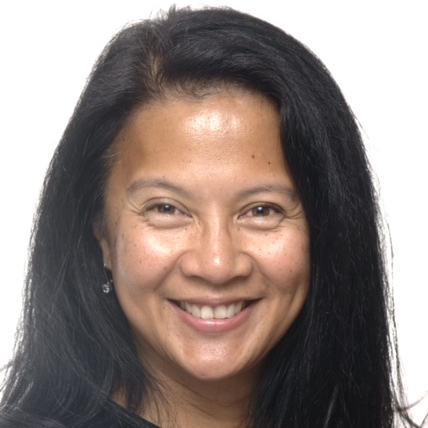To commemorate AAPIP’s 25 years of building a more democratic philanthropic sector, we asked you to help us identify 25 leaders who are making a difference in your local community and/or nationally. The 25 Leaders in Action honorees represent a diverse group spanning a wide range of organizations, years of experiences, roles and sectors. We invite you to learn about these outstanding leaders, their inspiring work and what keeps them going in our blog post series.
Rosie Abriam, President/CEO, The Center for Asian Pacific American Women, and Co-Chair, AAPIP Metro DC Chapter, and Co-Chair, Cherry Blossom Giving Circle
1. Why are you passionate about advocating for AAPI communities?
My story is really about awareness. The hard work and sacrifice for and within our family but also the recognition that we are part of a greater community. A community where we were fortunate to take advantage of opportunities. Each decision made by my family, whether to migrate to the US, to prioritize education as a pillar of the family, or to make sure that family values and cultures remained intact, each decision paved the road to the next possibility. Some doors were open and some we had to push open. However, all were made easier or at least more bearable by those who came before.
Growing up, our family was always involved in community, our church and eventually took a role in civic engagement. My mom worked polls and registered voters. She brought us to march picket lines. She advocated for equal rights and self-determination. She wanted her children to have a voice. My recognition for the need of a voice in our communities was born from student organizing. It was bittersweet when my first job after college provided me with a higher wage than the combined earnings of both my parents. It was a strong reminder that knowledge does not equate to wisdom NOR does money equate to success. While we may come from a place of compassion we live in a society of uneven perceptions and laws which often discriminate against those without a voice.
2. What do you believe are the most critical issues facing AAPI communities today?
Given my family’s experience and my parent’s emphasis on education, I believe access to quality education is critical for the growth and success of our communities. Secondly, we need to be engaged in our neighborhood and more active in our local, state or federal arenas. It’s important to know who our advocates are in our areas, and hold those electeds to task. We need to be engaged and participate. We need to speak out when it comes to government policies that directly affect us. We need to vote.
3. In what ways do you strive to address the unmet needs for AAPI communities?
There are MANY areas where our communities can do better. Over the years, The Center has built a diverse, deep and authentic network of APA women leaders. I know The Center has helped to connect, engage and nurture women across sectors to address a myriad of issues including education, philanthropy and corporate responsibility.
I feel so privileged to play a convener role – this is what I do best – bring folks together for possibilities and to support their forward movement.
4. What keeps you inspired?
The bamboo is a strong metaphor for our communities. During a storm, the bamboo survives because it is flexible. The bamboo has multiple strands which run from its root to the tip, they are the same. Organizations and communities are strong because we understand the value of being flexible while holding important ground.
The Center’s programs emphasize the power of stories. Everyone has a story to tell. These stories whether told with laughter or tears, are regenerative. Stories are like the strands in the bamboo … our communities are made of different strands of culture, religion, ethnicities, … They recognize that from generation to generation, the human story exists and binds us … we need to hold and grow against the storms of fear, greed and self-serving politics.
Rosie became the President/CEO for The Center for Asian Pacific American Women in 2008 to provide opportunities for women and our communities. “The Center” is a non-profit organization dedicated to building leadership capacity within our communities. Previously, her career spanned multiple disciplines across government and corporate entities. Rosie holds multiple patents in manufacturing, software and laser applications. These patents were developed while at New Focus, Inc., a startup photonics company in Silicon Valley where she led numerous projects in the United States, Europe, Asia and South America. Her work focused on laser development and fiber sensing applications in the biomed, oil & gas and civil engineering sectors.
Previously, Rosie worked in the Geophysical Division of Lawrence Livermore National Laboratory (LLNL) with Atmospheric Release Advisory Capability (ARAC), a DOE national emergency response program. While at LLNL, she received multiple awards including the Distinguished Physics Award from the Director of the Lab.
In 1995, Rosie was invited to join Women’s Investment Partnership (WIP), a small cadre of women in the technology industry interested in financial education. To date, the capital gains achieved under her presidency have been unmatched.
Rosie has taught martial arts for over 25 years and is a Gura Fifth Degree of the Kamatuuran School of Kali. She currently is associated with the Institute of Zen Studies in Honolulu. She is a 2002 Fellow of the Asian Pacific American Women’s Leadership Institute (APAWLI). She is a recipient of the 100 Most Influential Filipinas in America award.

